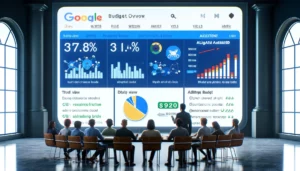Smart Spending Strategies for Google Ads in the Competitive UK Market: Budgets Unveiled

In the competitive UK market, smart spending strategies for Google Ads are crucial for businesses aiming to maximise their return on investment. This comprehensive guide aims to provide you with effective strategies for setting, managing, and optimising your Google Ads budget. Remember, successful budget management requires continuous learning, adaptation, and experimentation to stay ahead in the ever-evolving digital advertising landscape.
Key Takeaways
- Efficient budget allocation is essential for maximising ROI from Google Ads campaigns.
- Mastering Google Ads budgeting involves continuous learning and adaptation to market trends.
- Experimenting with different budgeting strategies can help identify the most effective approach for your business.
- Utilising tools like Google Ads Budget Reports and third-party management tools can enhance budget monitoring and adjustments.
- Staying informed about industry trends and best practices is crucial for ongoing success in digital advertising.
Smart Spending Strategies for Google Ads: Understanding the UK Digital Advertising Landscape
Key Market Trends
The United Kingdom (UK) is a hotbed of digital advertising activity, with fierce competition driving the need for sophisticated Google Ads strategies. Top UK agencies are setting the standard by producing ads that not only stand out but also connect with audiences on a personal level. This is achieved through personalisation, A/B testing, and dynamic ad features. For any PPC agency, staying ahead of these trends is crucial to maintaining a competitive edge.
Consumer Behaviour Insights (Smart Spending Strategies for Google Ads)
Understanding consumer behaviour is essential for effective ad targeting. In the UK, consumers are increasingly valuing privacy and personalised experiences. This dual demand requires a nuanced approach to campaign management. London PPC agencies, for instance, are leveraging data analytics to gain deeper insights into consumer preferences, thereby crafting more relevant and engaging ads.
Regulatory Considerations
Navigating the regulatory landscape is a significant challenge for digital marketers in the UK. The country is subject to both its own privacy laws and global standards like the General Data Protection Regulation (GDPR). This necessitates a sophisticated approach to campaign management that balances regulatory compliance with business objectives. A PPC ad agency must skillfully manage these modifications to ensure adherence to regulations while cultivating audience trust.
In 2024’s complex digital landscape, relevance and connection are just as important as visibility. Agencies that master this balance will see notable increases in CTRs and conversion rates.
Smart Spending Strategies for Google Ads: Setting Realistic Google Ads Budgets
Assessing Your Business Goals
Before diving into the numbers, it’s crucial to align your Google Ads PPC budget with your business goals. Are you aiming for brand awareness, lead generation, or direct sales? Each objective requires a different approach. For instance, a PPC eCommerce agency might focus on maximising sales, while a B2B service provider might prioritise lead generation. Understanding your primary goal will guide your budget allocation.
Determining Cost-Per-Click (CPC) (Smart Spending Strategies for Google Ads)
The next step is to determine your Cost-Per-Click (CPC). This involves researching industry benchmarks and analysing competitor data. Tools like Google Keyword Planner can provide insights into average CPCs for your target keywords. Remember, CPC can vary significantly based on factors like industry, competition, and location. For example, Google advertising agencies might face higher CPCs due to competitive bidding.
Allocating Funds Across Campaigns
Once you have a clear understanding of your goals and CPC, it’s time to allocate your budget across different campaigns. This requires a strategic approach. Consider the following steps:
- Identify High-Performing Campaigns: Focus on campaigns that have historically delivered the best ROI.
- Diversify Your Investment: Spread your budget across various campaigns to mitigate risk.
- Monitor and Adjust: Regularly review performance and reallocate funds as needed.
Effective budget allocation is both an art and a science. It requires continuous monitoring and fine-tuning to ensure optimal performance.
By following these steps, you can set a realistic and effective budget for your Google Adwords PPC campaigns. Whether you’re working with Google ads agencies or managing your campaigns in-house, these strategies will help you achieve your marketing objectives while staying within your budget.
Smart Spending Strategies for Google Ads: Effective Budget Allocation Strategies
Prioritising High-Performing Campaigns
To maximise your return on investment, it’s crucial to focus on high-performing campaigns. By analysing performance metrics, you can identify which campaigns are delivering the best results and allocate more budget to these areas. This approach ensures that your funds are being used efficiently, driving more conversions and higher revenue.
Seasonal Budget Adjustments (Smart Spending Strategies for Google Ads)
Seasonal trends can significantly impact consumer behaviour and, consequently, your ad performance. Adjusting your budget to align with these trends can help you capitalise on peak periods. For instance, increasing your budget during the holiday season can lead to higher conversion rates and sales. Conversely, during off-peak times, you might reduce your budget to avoid unnecessary spending.
Utilising Automated Bidding
Automated bidding strategies can enhance campaign efficiency by making real-time bid adjustments based on performance metrics. AI-powered algorithms can optimise your bids to ensure you’re getting the most out of your budget. However, it’s essential to monitor these automated systems to ensure they align with your overall business goals. A shared budget can also be beneficial, as it allows for the automatic redistribution of funds across campaigns based on performance and opportunities.
Efficient budget allocation is not just about spending money but about spending it wisely. By prioritising high-performing campaigns, adjusting for seasonal trends, and leveraging automated bidding, you can ensure your budget is working as hard as you are.
Smart Spending Strategies for Google Ads: Tools for Monitoring and Adjusting Your Budget
Effectively monitoring and adjusting your Google Ads budget is crucial for maximising your return on investment (ROI). Leveraging the right tools can make this process seamless and efficient.
Google Ads Budget Reports
The budget overview page offers a visual representation of your spending compared to the allocated budget. Using charts for daily or monthly views, you can easily identify trends or anomalies that might require immediate action, such as reallocating funds or adjusting bids. This feature is essential for maintaining control over your ad spend.
Third-Party Budget Management Tools (Smart Spending Strategies for Google Ads)
Beyond Google’s native tools, various third-party applications offer robust features for tracking and pacing your Google Ads budget. Applications like WordStream and Optmyzr offer robust automation options, custom alerts when budgets are nearing limits, bid optimisation recommendations based on AI algorithms, and comprehensive reporting features. It’s worth exploring such tools if managing multiple campaigns across different platforms with complex budgeting needs.
Real-Time Analytics and Adjustments
Real-time analytics are indispensable for making swift adjustments to your budget. These tools provide immediate insights into campaign performance, allowing you to make data-driven decisions on the fly. Building a custom budget tracker might be an option worth considering if you have specific requirements unmet by existing tools or want greater control over how you track and pace spending. Google Sheets offer flexibility and integration with Google Ads, which allows creating a tailored budget monitoring solution.
Manual intervention is required to ensure you do not overshoot your total monthly advertising budget. Automated tools can help, but always keep an eye on your overall spending to avoid any surprises.
Smart Spending Strategies for Google Ads: Experimenting with Different Budgeting Approaches
A/B Testing Budgets
A/B testing is a powerful method to determine the most effective budgeting strategies for your Google Ads campaigns. By running two different budget scenarios simultaneously, you can compare their performance and identify which one yields better results. This approach allows you to make data-driven decisions and optimise your ad spend. Remember to test one variable at a time to isolate its impact on your campaign’s performance.
Exploring Various Bidding Strategies (Smart Spending Strategies for Google Ads)
Different bidding strategies can significantly impact your campaign’s success. Experiment with manual CPC, automated bidding, and target CPA to see which strategy aligns best with your business goals. Each strategy has its advantages and can be more effective depending on your specific objectives and market conditions. For instance, automated bidding can save time and adjust bids in real time based on performance, while manual CPC offers more control over individual bids.
Adapting to Market Changes
The digital advertising landscape is constantly evolving, and your budgeting approach should be flexible enough to adapt to these changes. Monitor market trends, competitor activities, and consumer behaviour to adjust your budgets accordingly. Seasonal events, holidays, and market shifts can all influence the effectiveness of your campaigns. By staying agile and responsive, you can ensure that your budget allocation remains optimal and continues to drive high ROI.
Flexibility in budgeting is key to staying competitive in the dynamic UK market. Regularly review and adjust your strategies to keep pace with industry changes and maximise your advertising effectiveness.
Smart Spending Strategies for Google Ads: Maximising ROI with Smart Budget Management
To maximise your ROI, it’s essential to track Key Performance Indicators (KPIs) meticulously. KPIs such as Click-Through Rate (CTR), Conversion Rate, and Cost-Per-Acquisition (CPA) provide valuable insights into your campaign’s performance. Transparent reporting tools can help you understand where your budget is going and what’s working. Regularly reviewing these metrics allows you to make data-driven decisions and adjust your strategies accordingly.
Effective PPC management involves optimising your ad spend based on real-time data. AI-powered automated bidding algorithms have significantly improved, enabling real-time bid modifications based on a wide range of performance metrics. However, the human component remains crucial for strategic decision-making, especially when it comes to setting overall budget limitations and reallocating resources in response to performance. Consider using applications like WordStream and Optmyzr for robust automation options and comprehensive reporting features.
Understanding your audience is key to maximising ROI. Utilise audience insights to tailor your ads and ensure they resonate with your target market. This involves analysing demographic data, consumer behaviour, and purchasing patterns. By leveraging these insights, you can create more effective ad campaigns that drive higher engagement and conversions.
Efficient budget allocation and strategic bidding are essential for maximising ROI. Combining automated tools with human expertise ensures that your campaigns are both effective and adaptable to market changes.
Smart Spending Strategies for Google Ads: Staying Updated with Industry Trends
Subscribing to Industry Newsletters
To stay ahead in the ever-evolving digital advertising landscape, subscribing to industry newsletters is essential. These newsletters provide timely updates on the latest trends, features, and best practices in Google Ads. Regularly consuming this information ensures you are always in the loop and can adapt your strategies accordingly.
Attending Digital Marketing Webinars
Webinars are a fantastic way to gain in-depth knowledge from industry experts. They often cover a wide range of topics, from new Google Ads features to advanced budgeting strategies. By attending these sessions, you can ask questions in real-time and get insights that are immediately applicable to your campaigns.
Networking with Industry Experts
Building a network of industry professionals can provide you with invaluable insights and advice. Engage in online forums, attend industry conferences, and participate in local meetups. Networking not only keeps you informed but also opens up opportunities for collaboration and learning from others’ experiences.
Staying updated with industry trends is not just about consuming information; it’s about actively engaging with the community and applying new knowledge to stay competitive.
Conclusion
Mastering Google Ads budgeting is an ongoing journey that demands continuous learning, adaptation, and experimentation. The strategies outlined in this guide offer a robust foundation for optimising your ad campaigns’ performance, but always remain open to exploring new avenues for improvement. We hope this comprehensive guide has equipped you with the knowledge and tools necessary to manage your Google Ads budget effectively. Implement these strategies with creativity, prudence, and diligence – harnessing the power of smart budget management can propel your business towards success in the highly competitive UK digital advertising landscape.
Frequently Asked Questions
What is the importance of setting a realistic Google Ads budget?
Setting a realistic Google Ads budget ensures that your advertising spend aligns with your business goals, maximises ROI, and prevents overspending. It allows you to allocate funds efficiently across different campaigns and make data-driven adjustments.
How do I determine the Cost-Per-Click (CPC) for my Google Ads campaigns?
To determine the CPC, you need to consider factors such as keyword competitiveness, industry benchmarks, and your advertising goals. Google Ads provides tools and historical data to help estimate CPC for specific keywords.
What are some strategies for allocating funds across multiple Google Ads campaigns?
Prioritise high-performing campaigns, adjust budgets seasonally, and utilise automated bidding strategies. It’s essential to regularly review campaign performance and reallocate funds to maximise overall effectiveness.
How can I monitor and adjust my Google Ads budget effectively?
Use Google Ads Budget Reports, third-party budget management tools, and real-time analytics to track performance. Regularly review and adjust your budget based on data insights and market changes to ensure optimal spending.
Why is it important to experiment with different budgeting approaches in Google Ads?
Experimenting with different budgeting approaches helps identify the most effective strategies for your business. A/B testing budgets, exploring various bidding strategies, and adapting to market changes can lead to improved campaign performance and higher ROI.
What are the key performance indicators (KPIs) to track for optimising ad spend?
Key KPIs include click-through rate (CTR), conversion rate, cost-per-acquisition (CPA), return on ad spend (ROAS), and overall ROI. Tracking these metrics helps in making informed decisions to optimise ad spend and improve campaign performance.
Author
Search Blog
Free PPC Audit
Subscribe to our Newsletter
The Voices of Our Success: Your Words, Our Pride
Don't just take our word for it. With over 100+ five-star reviews, we let our work-and our satisfied clients-speak for us.
"We have been working with PPC Geeks for around 6 months and have found Mark and the team to be very impressive. Having worked with a few companies in this and similar sectors, I rate PPC Geeks as the strongest I have come across. They have taken time to understand our business, our market and competitors and supported us to devise a strategy to generate business. I value the expertise Mark and his team provide and trust them to make the best recommendations for the long-term."
~ Just Go, Alasdair Anderson




